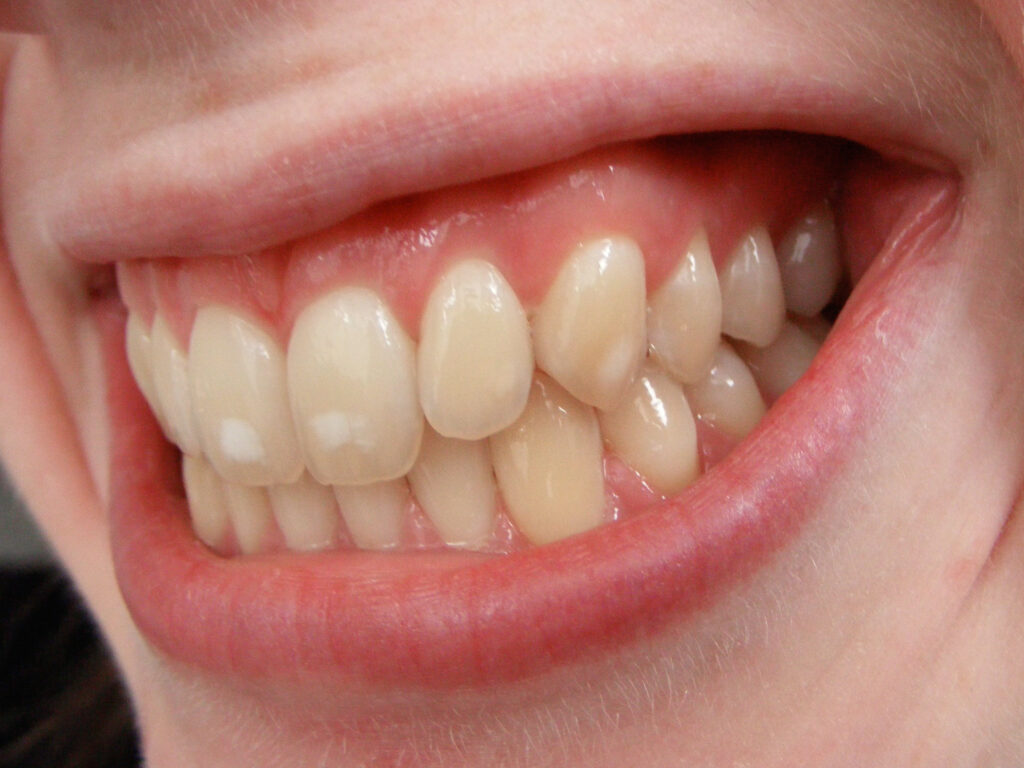If you’ve noticed white spots, stains, or marks on your teeth, you may be wondering what has caused them and if there’s something that can be done to get rid of them. Here is some information on white spots on teeth, including causes and treatment.
Why are my teeth getting white spots?
There can be a number of underlying causes for white discoloration of teeth, including dental fluorosis (excess fluoride), enamel hypoplasia (when the enamel on your teeth does not form properly), vitamin deficiencies, certain illnesses and infections, and trauma to the teeth.
White spots on teeth can also occur due to poor dental hygiene. These stains can be a sign of tooth decay due to a build-up of bacteria in the mouth and resultant loss of minerals from the teeth (this is called demineralization). Other causes of white stains on teeth include wearing braces and eating too many sugary or acidic foods.
Are white spots on teeth normal?
White spots on teeth are not normal, but they do not usually cause any health problems or affect dental function. However, sometimes, white spots on the teeth indicate an underlying problem like tooth decay that should be treated. Most of the time, people want to get rid of white spots on their teeth for cosmetic reasons. If white spots are making you self-conscious, treatments are available to restore your beautiful smile and confidence.
Can white spots on teeth go away?
White spots on your teeth will not typically go away on their own without treatment. There are many effective treatments for white spots and your dentist can recommend the best one for you. For example, if the white spots on your teeth are due to dental fluorosis, your dentist may recommend a fluoride-free toothpaste.
Can toothpaste get rid of white spots on teeth?
A remineralizing toothpaste can help strengthen tooth enamel and treat some types of white marks on teeth. However, it’s important to consult a dentist to find out what is causing the white spots on your teeth. Not all types of white spots respond to reminerlizing toothpastes. As mentioned above, if the white spots on your teeth are due to fluorosis, a fluoride-free toothpaste will be more appropriate.
How do you get white spots off your teeth?
There are several treatment options for white spots, stains, or marks on teeth. These include:
- Enamel abrasion to remove a small amount of enamel and make white spots on teeth less visible.
- Teeth whitening with over-the-counter products or professionally at a dental clinic.
- Dental veneers, which are thin protective coverings on the front surfaces of the teeth that can conceal white spots and other stains.
- Topical fluoride treatments for enamel hypoplasia.
- Composite resin to fill cavities and treat tooth decay.
Can you get rid of white spots on teeth naturally?
Some people find that brushing with a paste of white vinegar and baking soda can get rid of stains on the teeth, including white spots. You can try doing this once a week to see if it works. However, again, the best way to get rid of white spots on teeth is to consult a dentist so that you can treat not only the spots but also the underlying cause.
How do you prevent white spots forming on your teeth?
The best way to prevent white spots forming on your teeth in the first place is to practice good dental hygiene. This includes brushing your teeth twice a day and flossing daily. Also, try to limit the amount of sugary and acidic foods you eat (here are some tips on overcoming a sugar addiction). Additionally, if you drink well water, it’s a good idea to have it tested for fluoride levels once a year. Do not use fluoride supplements unless recommended by your dentist (these are only necessary for people living in areas that do not have fluoridated water).
Note that white spots on teeth frequently develop in children under the age of 10 years. Here are some precautions you can take to prevent this from occurring:
- Use fluoride-free water to make infant formula if your baby is primarily formula-fed.
- Ensure children use the right amount of toothpaste (about a grain of rice for under 3-year-olds and a pea-sized amount for kids over 3).
Seeing a dentist for white spots on teeth
If you want to consult a dental professional for white spots on your teeth, Express Dentist has a trusted network of dentists nationwide. Call us today and we’ll put you in touch with a dentist in your area who is accepting new patients.
About the author

Dr. Greg Grillo
Dr. Greg Grillo DDS studied at the University of Washington where he received a bachelors degree with Honors and later attended dental school on the same campus. Following school Dr. Greg served in the United States Navy as a dental officer. During this time he received advanced training in specialty areas of dentistry while also treating families of members of the military.
As well as sharing valuable information on dentistry and oral health, Dr. Greg remains a practicing dentist to this day. He works with families in the Okanogan Valley where he lives with his wife and three children.
- Dr. Greg Grillo
- Dr. Greg Grillo
- Dr. Greg Grillo
- Dr. Greg Grillo
- Dr. Greg Grillo
- Dr. Greg Grillo
- Dr. Greg Grillo
- Dr. Greg Grillo
- Dr. Greg Grillo
- Dr. Greg Grillo
- Dr. Greg Grillo
- Dr. Greg Grillo
- Dr. Greg Grillo
- Dr. Greg Grillo
- Dr. Greg Grillo
- Dr. Greg Grillo
- Dr. Greg Grillo
- Dr. Greg Grillo
- Dr. Greg Grillo
- Dr. Greg Grillo
- Dr. Greg Grillo
- Dr. Greg Grillo
- Dr. Greg Grillo
- Dr. Greg Grillo
- Dr. Greg Grillo
- Dr. Greg Grillo
- Dr. Greg Grillo
- Dr. Greg Grillo
- Dr. Greg Grillo
- Dr. Greg Grillo
- Dr. Greg Grillo
- Dr. Greg Grillo
- Dr. Greg Grillo
- Dr. Greg Grillo
- Dr. Greg Grillo
- Dr. Greg Grillo
- Dr. Greg Grillo
- Dr. Greg Grillo
- Dr. Greg Grillo
- Dr. Greg Grillo
- Dr. Greg Grillo
- Dr. Greg Grillo
- Dr. Greg Grillo
- Dr. Greg Grillo
- Dr. Greg Grillo
- Dr. Greg Grillo
- Dr. Greg Grillo
- Dr. Greg Grillo
- Dr. Greg Grillo
- Dr. Greg Grillo
- Dr. Greg Grillo
- Dr. Greg Grillo
- Dr. Greg Grillo
- Dr. Greg Grillo
- Dr. Greg Grillo
- Dr. Greg Grillo
- Dr. Greg Grillo
- Dr. Greg Grillo
- Dr. Greg Grillo
- Dr. Greg Grillo
- Dr. Greg Grillo
- Dr. Greg Grillo
- Dr. Greg Grillo
- Dr. Greg Grillo
- Dr. Greg Grillo
- Dr. Greg Grillo
- Dr. Greg Grillo
- Dr. Greg Grillo
- Dr. Greg Grillo
- Dr. Greg Grillo
- Dr. Greg Grillo
- Dr. Greg Grillo
- Dr. Greg Grillo
- Dr. Greg Grillo
- Dr. Greg Grillo
- Dr. Greg Grillo
- Dr. Greg Grillo
- Dr. Greg Grillo
- Dr. Greg Grillo
- Dr. Greg Grillo
- Dr. Greg Grillo
- Dr. Greg Grillo
- Dr. Greg Grillo
- Dr. Greg Grillo
- Dr. Greg Grillo
- Dr. Greg Grillo
- Dr. Greg Grillo
- Dr. Greg Grillo
- Dr. Greg Grillo
- Dr. Greg Grillo
- Dr. Greg Grillo




